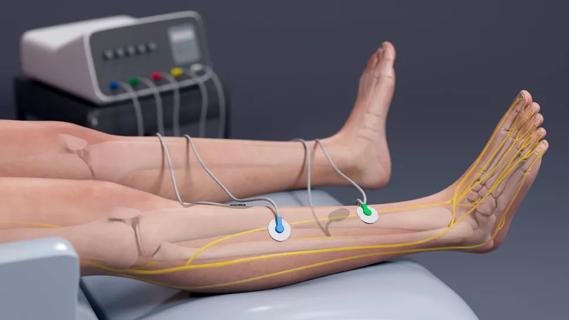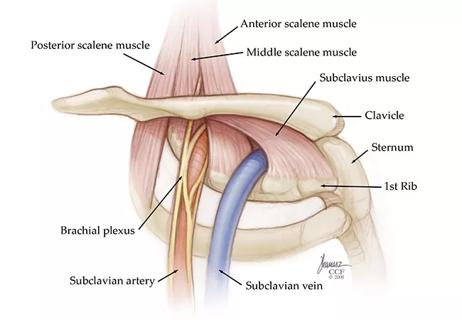Findings could help with management of a common, dose-limiting side effect

Enfortumab vedotin (EV) has been a practice-changing treatment in the management of locally advanced/metastatic urothelial carcinoma. However, peripheral neuropathy is a frequent, dose-limiting toxicity associated with its use. Now, a new multi-institutional study led by Cleveland Clinic researchers has identified potential pre-treatment risk factors associated with an increased risk of developing this treatment-related toxicity.
Advertisement
Cleveland Clinic is a non-profit academic medical center. Advertising on our site helps support our mission. We do not endorse non-Cleveland Clinic products or services. Policy
Specifically, the presence of high albumin levels and prior neuropathy at the start of treatment with EV were associated with an increased risk of EV-induced peripheral neuropathy (EVIPN). The findings could be used to help identify patients who may benefit from closer monitoring and/or earlier interventions during treatment to mitigate the development of EVIPN. The research is especially significant since the use of EV is expected to expand across earlier treatment settings for urothelial carcinoma in the coming years.
“We need to understand the underlying mechanisms and risk factors for dose-limiting toxicities like peripheral neuropathy so that patients are able to safely maximize the amount of time they’re on therapy when they are otherwise deriving therapeutic benefit,” said Amanda Nizam, MD, a genitourinary medical oncologist at Cleveland Clinic and first author of the study.
EV is an antibody-drug conjugate composed of a nectin-4-directed antibody linked to a monomethyl auristatin E(MMAE) chemotherapy payload. Nectin-4 is highly expressed on urothelial carcinoma cells, allowing EV to deliver MMAE directly into these cancer cells where it exerts its anti-cancer effects. Cumulative MMAE exposure leads to peripheral neuropathy.
EV, which gained accelerated FDA approval in 2019 followed by full approval in 2021, significantly improved progression-free and overall survival in patients with platinum- and immune checkpoint inhibitor-refractory locally advanced/metastatic urothelial carcinoma. In 2023, EV was approved in combination with pembrolizumab for the frontline treatment of locally advanced/metastatic urothelial carcinoma. EV is currently being evaluated alone and in combination with other agents in a broader population of patients, including in early treatment settings.
Advertisement
As part of the UNITE retrospective, multicenter study, researchers analyzed clinical data from 485 patients with advanced urothelial carcinoma who received EV monotherapy at 17 academic sites across the U.S. The study included 176 patients who developed any-grade EVIPN versus 309 who did not develop EVIPN. Of those who developed neuropathy, the median time on EV for all patients was 4.1 months, while the median time from EV start to onset of EVIPN was 2.5 months. Grade 1-2 neuropathy occurred in 89% of patients, while 11% of patients experienced grade 3 or higher neuropathy. Of that group, 9% of patients discontinued treatment due to development of peripheral neuropathy.
Along with identifying higher pre-treatment albumin level and prior neuropathy as risk factors, researchers found that patients with a history of diabetes had a lower risk. Nizam said researchers were surprised by the finding since poorly-controlled diabetes is often associated with peripheral nerve damage over time. However, she noted that this finding may have been due to most patients in the study having overall controlled diabetes without the need for insulin and thus should be further explored in a larger group of patients with insulin-dependent diabetes.
Along with EV, several other antibody-drug conjugates containing a MMAE payload are in development, making it a greater imperative to understand overlapping and cumulative toxicities among these agents.
Next, the researchers plan follow-up studies using data from clinical trials to prospectively identify and validate risk factors for the development of EVIPN.
Advertisement
“The use of EV and other MMAE-based antibody-drug conjugates is primed to expand across urothelial cancer treatment settings in the near future,” says Dr. Nizam. “Peripheral neuropathy is one of the most frequent and debilitating toxicities of these therapeutic regimens. To allow patients the opportunity to safely receive one or more MMAE-based therapies, we need to identify those patients who may be at increased risk of developing treatment-related peripheral neuropathy, so we can more proactively mitigate its development through dose modifications and potential treatment breaks, if needed.”
Study findings were presented at the 2024 European Society for Medical Oncology Annual Congress.
Advertisement
Advertisement

Multidisciplinary perspectives on the importance of early referral and more

Novel therapy “retrains” the brain to disrupt pain signals

Pain specialists can play a role in identifying surgical candidates

Novel approach begins reinnervation before tumor resection, preserving a young woman’s smile

Enfortumab vedotin plus pembrolizumab benefited patients, regardless of biomarker expression

Treatment involved checkpoint inhibitor, surgery and intravesical therapy

Platinum-eligible phase 3 trial of enfortumab vedotin and pembrolizumab yields ‘unprecedented data’

Enfortumab plus pembrolizumab reduced risk of death by 53% compared with platinum-based chemotherapy